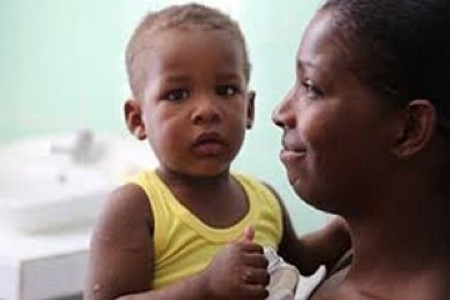ROSEAU, Dominica –The Dominica government has welcomed the island’s certification for the elimination of mother to child transmission of HIV and syphilis saying it is a step towards Dominica’s achievement of its sustainable development goals (SDG).
 (File Photo)“What we are celebrating here this evening is truly a remarkable achievement. Dominica has been able to maintain 95 per cent or more coverage of ante natal care and skilled attendance at birth,” Prime Minister Roosevelt Skerrit told the ceremony at which the World Health Organization (WHO) certification was made.
(File Photo)“What we are celebrating here this evening is truly a remarkable achievement. Dominica has been able to maintain 95 per cent or more coverage of ante natal care and skilled attendance at birth,” Prime Minister Roosevelt Skerrit told the ceremony at which the World Health Organization (WHO) certification was made.
He said that the island had also achieved 95 per cent or more coverage of HIV and syphilis screening of pregnant women, zero incidence of parental HIV per 1,000 lives of genital syphilis.
“As a result, there has been no recorded cases of mother to child transmission of HIV and syphilis in the Commonwealth of Dominica over the past four years,’ Skerrit said, adding that the “achievements of the dual elimination targets have additional positive implications as it contributes for Dominica to reach other sustainable developing goals.
He said these SDGs include the reduction of maternal and child mortality, universal access to sexual and reproductive health care services and universal health care coverage while contributing to the reduction in inequalities.
The Pan American Health Organization (PAHO) said Dominica has joined seven other Caribbean countries that have received the dual validation, “demonstrating continuing regional progress against the two diseases.”
The Dominica-born World Health Organization (WHO) Regional Director for the Americas, Dr. Carissa F. Etienne, said: “Dominica’s journey to this ambitious achievement represents a cumulation of years of expanding the capacity of its primary care services to address communicable diseases and adopting harmonized and integrated approaches to improving the health outcomes for women and their children within maternal and child health services”.
WHO/PAHO Representative for Barbados and the Eastern Caribbean, Dr. Yitades Gebre, highlighted the goal of the elimination of mother to child transmission of HIV and syphilis.
“Today we are celebrating the validation of the achievement of mother to child transmission of HIV and syphilis in the Commonwealth of Dominica. The goal of the elimination program is to ensure that mother to child transmission …is controlled and reduced to very low level.”
She said this milestone “marks the beginning of the end of HIV epidemic in children” here while Health Minister Dr. Irvine McIntyre said Dominica had been able to meet all the criteria required by the international health agency in order to receive the certification.
“The Ministry of Health is aware of the need to maintain the elimination status when the re-evaluation is done in the next two years and the ministry pledges to do all in its capacity to achieve this,” he added.
PAHO said that while Dominica received the certificate for elimination during the ceremony on Friday, the country was recommended by WHO for certification last September.
New HIV infections among children in the Caribbean declined by nearly 40 per cent between 2019 and 2010 – the year that the Regional Initiative for the Elimination of Mother-to-Child Transmission of HIV and Congenital Syphilis in Latin America and the Caribbean was launched, PAHO said.
During that period, it said the number of cases declined from 3,400 to 1,500.
PAHO said reported cases of congenital syphilis in the Caribbean are now at 9.6 cases per 100,000 newborns, well below the goal of no more than 50 cases per 100,000 newborns.
PAHO said the seven other Caribbean countries and territories that have received the dual certification are Cuba in 2015 and Anguilla, Antigua and Barbuda, Bermuda, Cayman Islands, Montserrat and St. Kitts-Nevis in 2017.
Director for the Caribbean Sub-regional Office of UNAIDS, Dr. James Guwani, said that Dominica’s success brings the country and region a step closer to ending AIDS.
“Dominica’s achievement in ensuring that its children are born free of HIV is truly inspiring, and is testament to the combined strength and leadership of government, civil society activists and communities living with and affected by HIV,” he said, adding “by putting people first, we can end the AIDS epidemic.”
UNICEF’s Regional Director for Latin America and the Caribbean, Jean Gough said: “from now on, every child will be born free of HIV and congenital syphilis in Dominica. No mother will transmit these diseases to her children. Today is a moment of pride for the country, but also a source of hope for many others in Latin America and the Caribbean.”
Director of the Pan Caribbean Partnership against HIV and AIDS (PANCAP), Dr. Rosmond Adams, described the elimination as remarkable.
“This is a commitment by Dominica that no child is born with HIV or congenital syphilis,” she said. “It is also an indication of the country’s commitment and the hard work of the health care providers to reduce new HIV infections, which is a key strategy towards achieving the 2030 Sustainable Development Goals”.


